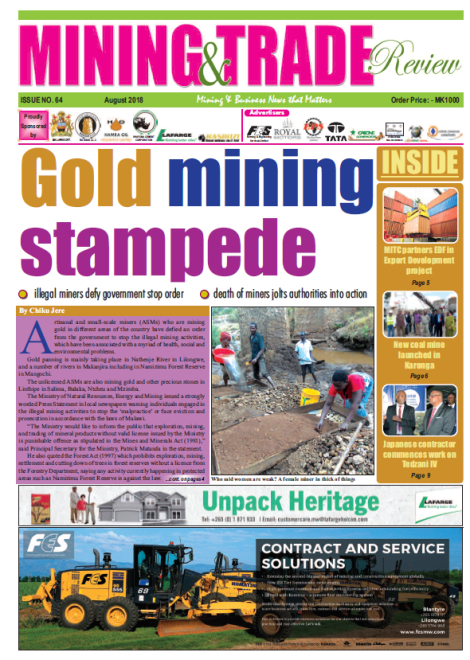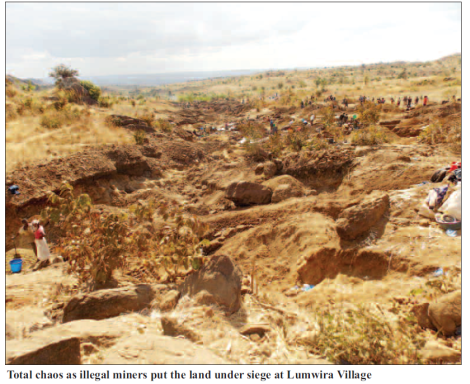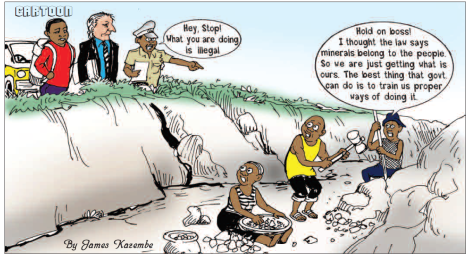
Gold mining stampede
…illegal miners defy government stop order
…death of miners jolts authorities into action
By Chiku Jere
Artisanal and small-scale miners (ASMs) who are mining gold in different areas of the country have defied an order from the government to stop the illegal mining activities, which have been associated with a myriad of health, social and environmental problems.
Gold panning is mainly taking place in Nathenje River in Lilongwe, and a number of rivers in Makanjira including in Namizimu Forest Reserve in Mangochi.
The unlicensed ASMs are also mining gold and other precious stones in Linthipe in Salima, Balaka, Ntcheu and Mzimba.
The Ministry of Natural Resources, Energy and Mining issued a strongly worded Press Statement in local newspapers warning individuals engaged in the illegal mining activities to stop the ‘malpractice’ or face eviction and prosecution in accordance with the laws of Malawi.
The Ministry would like to inform the public that exploration, mining, and trading of mineral products without valid license issued by the Ministry is punishable offence as stipulated in the Mines and Minerals Act (1981),
said Principal Secretary for the Ministry, Patrick Matanda in the statement.
He also quoted the Forest Act (1997) which prohibits exploration, mining, settlement and cutting down of trees in forest reserves without a licence from the Forestry Department, saying any activity currently happening in protected areas such as Namizimu Forest Reserve is against the law.
The Ministry gave the miners July 20, 2018 as the deadline to stop the activities and urged the public to report any suspected illegal mining practices to the Ministry’s headquarters, Departments of Mines, Forestry and Geological Survey, District Commissioner’s offices and law enforcing agents.
It also urged local communities to desist from encouraging the malpractice through provision of shelter, food, labour, selling of merchandise and providing mining plots in their land to the dealers.
But Mining & Trade Review has established that despite the threats from the government, the miners are still continuing with the illegal activities, which have attracted buyers from different countries including Tanzania, Mozambique and Zimbabwe.
Efforts to get a comment from Mines Department on the issue on what measures the government will deploy to enforce the stop order proved futile, as Director of Mines, Jalf Salima, was reportedly out of office.
But speaking to Mining & Trade Review in a telephone interview, ten days after the deadline, Gemstone Association of Malawi (GAM) Central Region vice secretary, Percy Maleta, who is also Chairperson for Nyasa Mining Corporative, confirmed that the miners are still on the sites.
He said the stubborn miners have mainly intensified their activities in Nanthenje and Makanjira, and it will be very difficult to stop them by force saying the only way to bring sanity over the issue is to regularize the activity by training the miners, issuing them with proper licences, and monitoring their work as the scenario is in other countries.
We are yet to get off the ground in Malawi. Makanjira in Mangochi, Lisungwi in Balaka, Nanthenje in Lilongwe has over 5000 gold miners (illegal) all given a deadline of 20-07-28 to vacate the land. As of last week (past the deadline) Nathenje Lilongwe had well over 50 gold buyers (illegal) managing an average of five grams per person per day. Mangochi on a good day produces a kilogram from well over 2000 gold panning army,
said Maleta in a Facebook post.
The illegal mining activity started in Nanthenje a few months ago but has been happening unabated for some time in the other areas.
The government’s stop order came after three Lilongwe women lost their lives along Nanthenje River banks following the collapsing of the land where the three were extracting alluvial gold dusts as well as rhodolite.
Lilongwe Police spokesperson Kingsley Dandaula was quoted by Malawi News Agency (MANA) as having identified the deceased three as 26 year-old Rosemary Chimbereko and Mtamandika Chipira 43, both of Mazinga Village, and Rofina Jackson aged 36 of Kachikho Village, T/A Chadza.
The police publicist said the three were buried alive in the course of digging the river bank, and efforts by their friends to rescue them proved futile. Postmortem results revealed suffocation as the cause of death.
Mining & Trade Review crew’s visit to several of these mining spots revealed extreme extents individuals are prepared to go just to eke a better living from the activity despite the risks.
At Nanthenje mining spot – Lumwira and Dzondi Villages T/A Mazengera – the crew found about 3000 people – men, women, boys, girls and families- toiling; determinedly digging, shoving, head-carrying bags and tins full of supposedly gold-rich soil and panning, just to get their hands on the prized minerals.

Maxim Sam’mange, his wife and son who migrated from Nsanje were among those found panning gold from a pile of soil the family had dug and ferried to the river from a distance of about three kilometres.
It all started when my wife got wind of the trade and convinced me to come and invest in the venture. I have never regretted doing so because though the work is tough, we have struck gold here and we are getting instant reward for our sweat unlike other business ventures which require you to toil for ages to start earning something tangible,
said Sam’mange.
Asked where he learned the gold panning art, Sam’mange said free training is provided right on the spot by fellow miners well versed in the trade.
Gifton Brighton, a young man from Tsabango Village, said he rushed to join the free-for-all mining jamboree following a tip from a friend.
I was in Mozambique working but when I heard that people were mining gold I decided to leave my job and rush back home to join the party since I had an idea regarding the profitability of the undertaking having previously taken part in similar activities in Nanjiri River,
he said.
According to the miners, the proceeds range from K100,000 to K200,000 in every three days, but when luck strikes, one can cart home in excess of a K1 million or two in a day.
They get the “gold mine,” which is a small plot of land where one digs and searches for the prized mineral, on lease from villagers at prices ranging from K3000 to K20,000, depending on the size of the plot, but the money is paid after the soil has been sampled and its mineral containment has been proven.
Jacqueline Bwanali from Lumwira Village T/A Mazengera is one of such land owner who professed to have benefitted from leasing out land plots in her garden to the illegal miners.
As you may know, this is farming off-season; most of us are preparing for the next season and the money we have realised from hiring out these pieces of land will assist in purchasing farm inputs such as fertilizer, seeds, among others,
she said.
But Consulting Geoscientist, Ignatius Kamwanje, said despite such gains for the miners and landlords, the practice immensely contributes to environmental degradation and numerous social problems.
The undertaking has adverse effects on land and water resources (surface and groundwater), air quality as well as causing noise and earth vibrations through use of tools, equipment or machinery,
he said.
The expert said this affect miners directly because they mostly do not use safety or monitoring equipment to reduce the effects and determine the extent of respective impacts.
He also said mine waste materials including waste rock (gangue) and tailings (fine-sized materials left after processing), are often dumped in and around mine sites and with time, these materials break down as a result of interaction with water, air and organisms to release various elements/substances such as mercury, arsenic, cadmium and lead which are toxic, contaminate the surrounding environment or may be healthy hazards.
In previous times, deaths due to illegal mining practices that are conducted without any safety measures were also reported in Salima and Makanjira.
Deputy Director of Mines, Atileni Wona, reportedly told Mining & Trade Review that lack of toilets at the illegal mining sites is another major concern which may lead to the spread of diseases such as cholera.
Wona said there is also danger of prostitution and spread of HIV/Aids at the mining sites as some of the miners migrate to camp at the sites leaving their spouses at home.

***
This piece was initially published in Malawi’s Mining & Trade Review Issue Number 64 (August 2018).
The full edition is available for download here. This monthly publication is edited by Marcel Chimwala.

This is April 2019. Whats the status of this matter now.
Artisanal gold mining continues in Nathenje and a few other hot spots across the country, some indication that mercury may be being used, buyers generally foreigners and some (from Tanzania and Mozambique, mainly) are paying spot prices and trying to buy as much as possible. Limited regulation still. No reports of recent death and injury but that does not rule this out, unfortunately.
give malawians good training